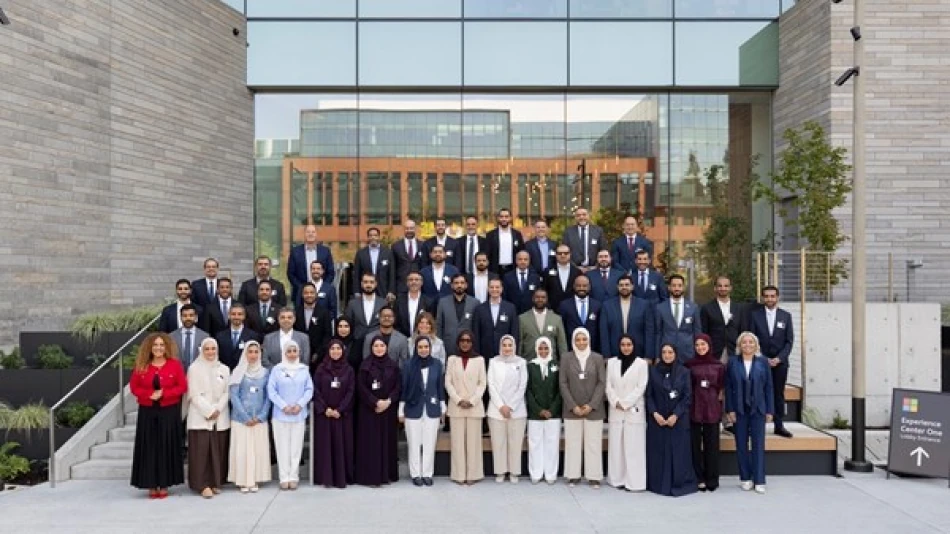
Top AI Execs Explore Tech Giants' Innovations Across America
The UAE's AI executives just wrapped up the region's first program of its kind - a 10-day intensive trip to 13 major US tech companies. The delegation met with over 200 tech representatives and experienced more than 20 hands-on technology demonstrations, building partnerships that could reshape the Emirates' digital future.
The government delegation was led by Mohammed bin Taliah, head of government services, and Dr. Mohammed Al Kuwaiti, chairman of the UAE's cybersecurity council. They visited tech giants including Google, Meta, OpenAI, Palantir, Nvidia, IBM, Amazon, and Microsoft, along with the US-UAE Business Council and Cohere.
This wasn't just a typical trade mission. The UAE is positioning itself as a global tech hub, and these meetings focused on concrete partnerships rather than general discussions. The timing matters - as AI reshapes government services worldwide, the UAE wants to stay ahead of the curve.
Omar Sultan Al Olama, the UAE's Minister of State for AI and Digital Economy, said the trip supports the country's goal to become a global technology center. The UAE has been investing heavily in AI infrastructure and wants to translate that into practical government applications that improve citizen services.
Here's what the delegation saw at each company. Meta showcased its augmented reality future, including Orion smart glasses and practical applications of its Llama platform in key sectors. The sessions focused on wearable technology that could enhance daily life and work.
Google demonstrated its latest AI innovations, particularly AI agents that can make independent decisions. The delegation tested Google Agent Space and Gemini platforms, which offer secure AI solutions. Google Cloud also presented its sustainability efforts through renewable energy and carbon tracking technologies.
At Palantir, executives including VP Nom Persky and USG President Akhi Jain discussed data-driven partnerships and AI investment returns. The session was moderated by Said Al Falasi, executive director of Dubai's AI Applications Center, highlighting the practical side of AI implementation.
OpenAI provided hands-on experience with a new UAE-specific ChatGPT version and shared insights about digital transformation in the Emirates. This suggests OpenAI might be developing localized solutions for the UAE market.
Nvidia showed off its advanced hardware - the graphics processing units and data center infrastructure that power modern AI systems. The delegation explored several platforms: Build Nvidia for real-time video analytics and smart factory monitoring, Isaac Groot for robot training, and Omniverse for creating digital twins and industrial simulations. Nvidia also presented its new Blackwell architecture designed to boost AI performance.
IBM focused on responsible AI and sovereign AI - topics that matter for governments concerned about data control and ethical AI deployment. Amazon demonstrated interactive AI and AI-powered automation, including experiences at The Spheres and Amazon Go stores, showing how AI enhances customer experiences.
Microsoft closed out the trip with discussions about AI's future in cybersecurity. The delegation learned about cloud data sovereignty and organizational readiness for modern solutions. Microsoft demonstrated its Azure AI Foundry platform for building AI applications and agents, plus AI-powered Copilot and Microsoft 365 tools.
The UAE created these AI executive positions after the Cabinet, chaired by Sheikh Mohammed bin Rashid Al Maktoum, approved the new roles across federal ministries. The positions require candidates who understand fast-changing technology environments and can develop AI solutions for government work.
This connects to the UAE's broader Vision 2031, which aims for global leadership in AI and digital technology. The country is betting that early adoption and strong partnerships with US tech companies will give it a competitive edge in the Middle East region.
For investors and tech companies, the UAE represents a significant opportunity. The country has oil wealth to fund AI initiatives, a government willing to experiment with new technologies, and a strategic location connecting East and West. These partnerships could lead to pilot programs that other countries might later adopt.
The trip signals that the UAE isn't just buying technology - it's building relationships that could influence how AI develops in government applications globally. With AI executives now embedded in every major ministry, the Emirates is setting up infrastructure to move quickly when opportunities arise.
Most Viewed News

 Layla Al Mansoori
Layla Al Mansoori






